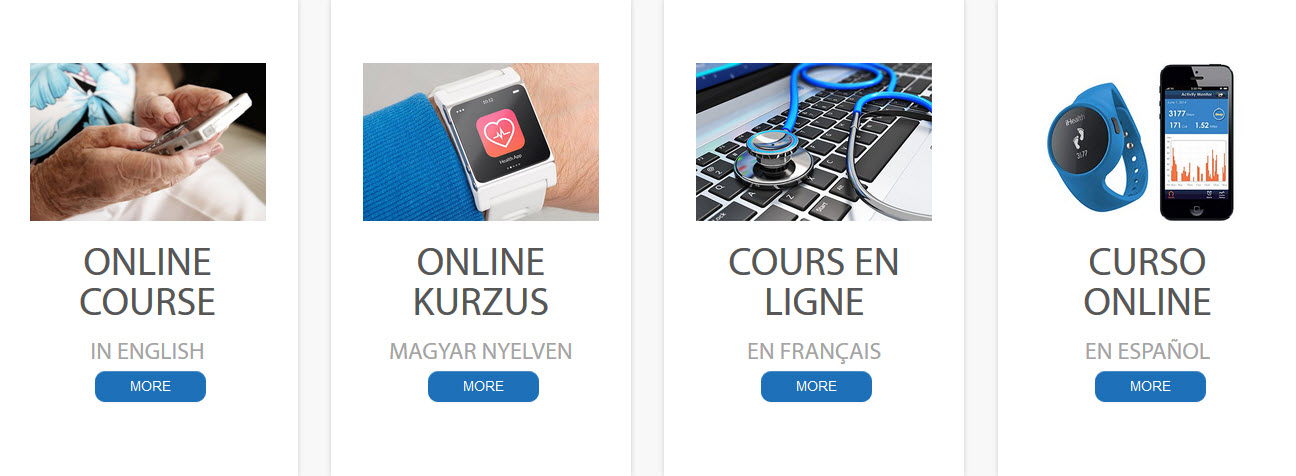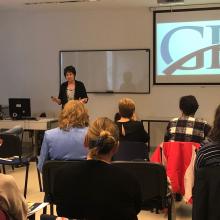Connected Care of Older Adults - online course
Twenty-first century Europe is experiencing an uplift in the health of its population, with adults living longer, healthier lives than ever before. This has an impact on the demographic profile of our communities, with a higher proportion of older adults among the population. While most of these people are health and do not suffer from acute illnesses, they are more likely to contract chronic conditions and gradually they require support to live independently.
Different countries have different preferred solutions for care of older adults, with a mixture of family/community care, home helps services and residential nursing homes. It is generally accepted that the minimum amount of outside intervention is best, and that residential care should be reserved for those who need 24/7 care.
 The increase in the number of healthy older adults puts an onus on society and social services to keep them safe and to maintain their good health for as long as possible. The most advantageous solution for the wellbeing of older adults is to facilitate them to live at home independently, with minimal support and assistance. Families (informal careers) are often willing to do much of this, but family time is limited with employment and child-care considerations, so the demand for social carers (formal carers) is increasing, with supply not adequately keeping up with demand. The demand and shortage of carers for older adults extends to residential nursing homes as well.
The increase in the number of healthy older adults puts an onus on society and social services to keep them safe and to maintain their good health for as long as possible. The most advantageous solution for the wellbeing of older adults is to facilitate them to live at home independently, with minimal support and assistance. Families (informal careers) are often willing to do much of this, but family time is limited with employment and child-care considerations, so the demand for social carers (formal carers) is increasing, with supply not adequately keeping up with demand. The demand and shortage of carers for older adults extends to residential nursing homes as well.
The care of older adults must also take into consideration the need they have for companionship and social interaction, for the maintenance of positive mental health which can prevent physical deterioration of ageing adults living alone.
One way to address this shortage of social carers, and to ensure social engagement, is to utilise the growing number of ICT solutions, telecare systems and appropriate social networks that are coming on to the market to support the carers and to focus their time on essential person to person interactions.
The sophistication of ICT based telecare systems being developed makes this a feasible approach, but there are few carers who have the competence to use them effectively, and to instruct the adults themselves to cooperate with the approach and to use them themselves. This is the major barrier to their widespread adoption. There are a number of contributing problems, mainly due to inadequacies in training programmes for carers of older adults, which do not cover:
- The new demographic reality where there are increasing numbers requiring assistance to live active lives in their own homes
- ICT based systems, apps and services that could reduce the exclusive reliance on human carers
- Skills to use these telecare systems and to guide older adults to engage with them.
- Knowledge of the potential of virtual networks in social care, and the competence to setup and facilitate virtual communities.
Aim of the course
The Connect ed Care of Older Adults course is a competence-based, modular training programme designed for formal and informal carers. It aims to equip carers with and understanding of the demand for new approaches to care and to enhance its delivery through the use of a variety of eHealth technologies and smart devices, like home appliance monitoring, activity sensor wristbands, movement monitors, and even some tele-diagnostic tools installed in the home. It will provide them with an advanced eHealth literacy and tailored digital competences to get the best advantage from the ICT tools.
ed Care of Older Adults course is a competence-based, modular training programme designed for formal and informal carers. It aims to equip carers with and understanding of the demand for new approaches to care and to enhance its delivery through the use of a variety of eHealth technologies and smart devices, like home appliance monitoring, activity sensor wristbands, movement monitors, and even some tele-diagnostic tools installed in the home. It will provide them with an advanced eHealth literacy and tailored digital competences to get the best advantage from the ICT tools.
The course will be delivered in an innovative, practice-oriented manner, competence-based and modular, as a supplement to the required vocational qualification for carers of older adults. It will develop the advanced digital skills of formal and informal social caregivers, to prepare them for effective use of the ICT-based telecare systems and prepare them to apply web-based tools for communication, keeping contact through the Internet for supporting independent living of older adults.
The delivery is intended to be practical and interactive, with on-the-job and case study components, as well as competence-based assessment and project work.
Target Groups
- students of vocational education
- formal caregivers, care workers
- informal caregivers involved in the long-term-care of their relatives
- „young” elderly people retired from related professions (e.g. teachers), who are interested in working as informal caregivers in online communities.
Training methodology
This course will be developed as a fully online programme, but all resources will be available offline for face-to-face, teacher led delivery.
Modules
Module 1: Digital skills for caregivers
Module 2: Active and healthy ageing
Module 3: Assistive technologies
Module 4: Virtual communities
Assessment
These tasks are used to calculate the overall performance of the participant:
- Activity in online collaboration and in the discussion forum related to the modules.
- Credited Assignment after Module 2, 3 and 4.
The activities will be evaluated by the tutor. Threshold for success: 75%
Course information
The online courses start in May, 2019 in the partner countries in English, French, Spanish and Hungarian on the e-learning platform of http://moodle.grandis21.hu/.
Further information: maria.hartyanyi@prompt.hu

 Multiplier event Hungary - PROMPT
Multiplier event Hungary - PROMPT










 Back to the top
Back to the top